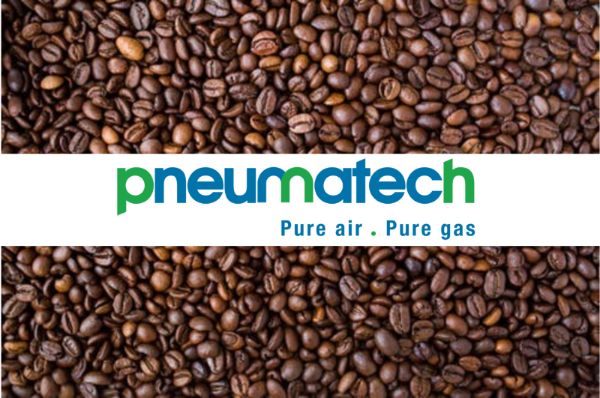Proportioning the Compressed Air Dryer
Trying to figure out which air dryer capacity is best for you? Here are some factors to consider. Read More…
 Coffee,
like all other food & beverage products, must go through a preservation process to keep the beans fresh during storage and packaging
before they reach the consumer. Coffee that is not properly stored after it is roasted will lose a large amount of carbon dioxide, which
lessens its' flavor and speeds up the staling process. One of the most common ways to preserve the freshness of coffee is the use of
nitrogen gas.
Coffee,
like all other food & beverage products, must go through a preservation process to keep the beans fresh during storage and packaging
before they reach the consumer. Coffee that is not properly stored after it is roasted will lose a large amount of carbon dioxide, which
lessens its' flavor and speeds up the staling process. One of the most common ways to preserve the freshness of coffee is the use of
nitrogen gas.
After roasting, coffee beans are often stored in large airtight containers for weeks if they are not ready to be packaged. This containers are flushed or purged with nitrogen gas to preserve the life of the coffee and to push out any inside oxygen that could reduce the quality of the coffee. An on-site nitrogen generator is ideal for coffee storage, because over time the generator will continuously push nitrogen into the containers to keep the coffee fresh. Since nitrogen is colorless and odorless, this has no effect on the flavor or appearance of the coffee over time.
Once the coffee is ready to be packaged, it still needs to be preserved to increase the shelf-life of the product. The coffee beans are dropped into a packaging machine, usually into a funnel or hopper at the top, and then dropped through the machine into bags where they are flushed with nitrogen gas while the bags are filling and until they are sealed. Typically the purity of the nitrogen used in packaging is somewhere between 99 - 99.9%. Similarly, K-Cups and other coffee pod type products also utilize nitrogen in their packaging. As the cups are filled, they are flushed with nitrogen and then sealed to prevent oxygen and moisture from reaching the coffee. Oxygen levels are reduced to less than 3%, providing an even longer shelf life for these pods.
Starbucks and other major coffee houses have added the latest "nitro-brew" trend of coffee to their menus in recent years. Nitro-brew is coffee that is brewed with pressurized nitrogen gas, cooled down and stored usually in kegs and then served "on tap". Nitro-brew is typically sweeter than regular coffee and smoother and can often contain more caffeine than regularly brewed coffee. Different from coffee packaging, nitrogen is not used for preservation purposes in this case, but more for flavor and a different product quality. Consumers who typically add cream and sugar to black coffee are more fond of the already sweet nitro-brew. The same process is also able to be implemented into beer and various teas.
Nitrogen is essential to coffee manufacturers and coffee houses for both preservation needs and new, trendy products. Having an on-site gas generator for both packaging/storage and brewing is ideal for constant access to nitrogen and to have the ability to control the purities for various processes.
Pneumatech designs and manufactures both standard and engineered on-site gas generator products. Nitrogen and oxygen generators are available with Pressure Swing Adsorption (PSA) technology, while also membrane technology is offered for lower nitrogen purity levels.
Since 1966, Pneumatech has provided industry-leading compressed air and gas treatment solutions to production facilities across the globe. Our innovative machines and accessories provide clean, dry air and gas to industries such as automotive, textile, power generation, oil & gas, food & beverage, and electronics. We design equipment that is easy to configure, transport, use and maintain. And we provide responsive service globally to ensure you get the most out of your equipment over its long lifetime. Furthermore, we have the capability to engineer products to fit your specific applications.
Do you have an idea for our #expertcorner? Let
us know!
Ash Air has been around in New Zealand since 1979, and we’ve grown into a nationwide company with international support and a reputation for quality and reliability.We look after all things compressed air for your business!
Ash Air's range of Chicago Pneumatic, Alup, Pneumatech, and Quincy compressors are used extensively around the world in industries ranging from oil and gas to food, automotive and farming, and we bring you these world class compressors here in the land of the long white cloud.Our technicians are compressed air equipment experts and are dedicated to addressing customer needs. Supported by a 13 locations nationwide, Ash Air offers one of the widest selections of compressed air equipment and parts available today in New Zealand.
With Ash Air compressors, you can count on reliability and high performance for even the most demanding applications. We focus our efforts on the following:
Talk to the team today:
Proportioning the Compressed Air Dryer
Trying to figure out which air dryer capacity is best for you? Here are some factors to consider. Read More…
Maintenance budget: 8 factors to consider
Just like any other equipment, a compressed air installation also requires the necessary maintenance work during its entire lifespan. Even though maintenance costs are only about 5 to 10% of a machine's annual operating costs, failure to budget for maintenance can have potentially disastrous consequences. Read More…
The air dyer is one of the most ignored cooler in the system. A dirty condenser will cause water in the lines, or worse it will cause complete dryer failure. Read More…